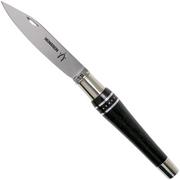

You have an outdated webbrowser. The website might not work correctly.
Ever since the 16th century, Coutellerie Nontronnaise has been producing pocket knives in the French village of Nontron. That makes Nontron the oldest, still existing knife brand in France. Like before, these knives are still produced by hand. The distinctive feature of a Nontron knife is the inverted V symbol burnt into the wooden handle by pyrography. The reversed V is an old and mysterious symbol of which the origin is unknown. Regardless of the historical meaning, the charm of a Nontron knife is absolutely timeless!
A Nontron knife is traditionally made to be used. From food prep during a picnic to cutting your steak in a fancy restaurant. This ancient, proven design still exists for a reason after all. It is a functional tool that is also aesthetically pleasing.
Many Nontron pocket knives are equipped with a ferrule lock. This is a type of latch that is somewhat similar to the one we know from Opinel. The ferrule is a ring that rotates around the pivot. This makes sure the blade is blocked.
The No. 22 is a French pocket knife as you would expect a French pocket knife to look. The No. 22 has an 8 cm long blade, making the No. 22 one of the more compact pocket knives from the Nontron range.
The Nontron No. 25 is very similar to the No. 22, but just a size bigger. Thus, the No. 25 sits between the No. 22 and the No. 30.
The Nontron No. 30 is one of the largest pocket knives in the Nontron range, in the same style as the No. 22 and the No. 25.
The Nontron Violin Knife is a classic slipjoint pocket knife from France. Take it with you on your picnic or hikes for small cutting tasks. This pocket knife is also popular among collectors!
Nontron's kitchen knives are made in traditional French style, but with a simple and elegant design. Like their pocket knives, most kitchen knives have handles made from wood, usually olive wood or boxwood. This gives them a natural look and makes them feel great in hand. Nontron kitchen knives often feature an identifiable brand stamp on the blade or handle to reflect their authenticity. Nontron's range of kitchen knives includes a bread knife, a carving knife, an oyster knife, a corkscrew and more.
Writings and excavations have proven that forging knives was a part of daily life in France long before the Middle Ages. Writer Guillaume de la Villeneuve, for instance, already refers to 'Pierregord knives' from Perigord in the 13th century. Even after those days, they praised blacksmiths for their skills in poems and songs. Historians even claim that the French king Charles VII (1403-1461), also called 'The Conqueror' by Joan of Arc, had his sword made in Nontron. In the 18th century Nontron had thirty-five knife makers. Because of a series of events, this number was reduced until only one was left in 1928: Coutellerie Nontronnaise. On 21 June 2000, the new studio, designed by Luc-Arsène Henry opened its doors. Coutellerie Nontronnaise is the only one who continues and maintains this ancient knife tradition. It's an homage to all blacksmiths who, throughout the centuries, put their heart and soul into these knives. In short: a Nontron knife speaks volumes!
Today, Nontron knives are still largely made by hand. With local products and equipment, just like in the 16th century. It takes 40 steps to produce a Nontron knife. Each knife is made by the same person from start to finish. From shaping the handle and adding the brass or nickel silver ferrule, to polishing the wood and sharpening the blade. These blades, made from French T12 steel, have been produced in the Forge de Laguiole workshop ever since 1992. Coutellerie Nontronnaise uses box wood for many of its knives. This wood originates in France and is left to dry for 4 years before it is used.